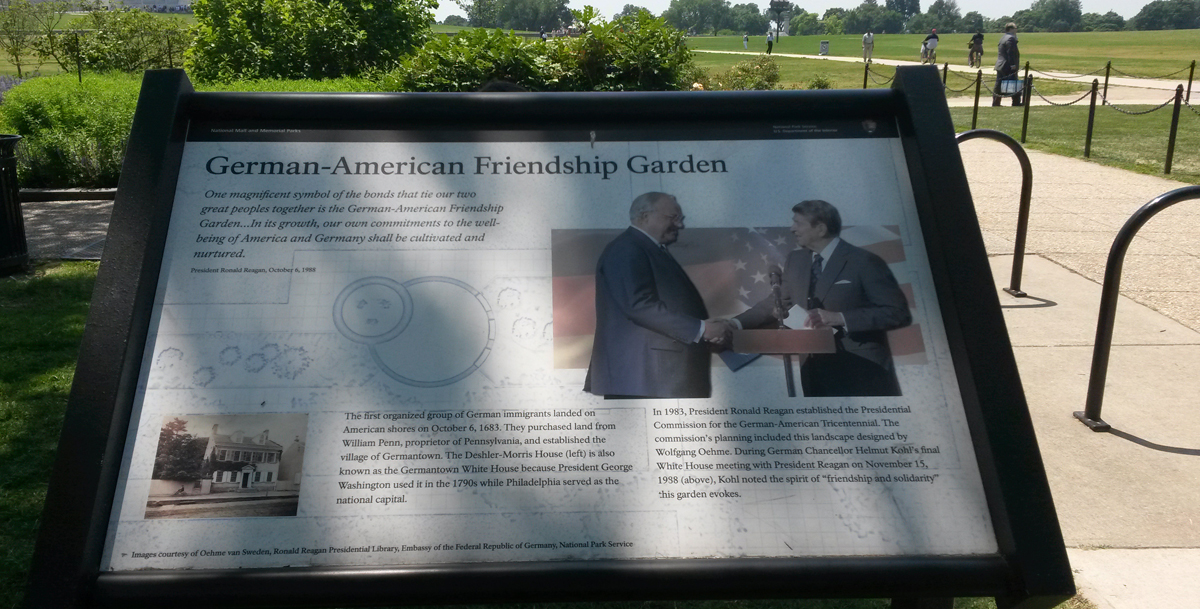Dear Mr. President,
Recently, you welcomed our Chancellor Angela Merkel to the White House. Instead of the predicted clash, you obviously had a productive meeting with her – despite everything we could read in the press and some awkward pictures from the Oval Office.
Maybe our chancellor conveyed an important message to you: The Germans are the last to give up on America. Well, perhaps not all the Germans. There are quite a few people in this country who would join the resistance against you and your policies if they lived in the U.S. However, our government is undeterred, it seems. Many people in this country are unwilling to give up on their friends in the US.
We have witnessed heavy storms in the relations between our two countries. The German government even dared to say “No!” to the war in Iraq. Nevertheless, when the invasion was launched against all the opposition from other countries, the Germans still wanted the Americans to somehow succeed. But, as we know now, this did not occur – people are still dying as a consequence of that war.
Why do the Germans (at least our government) want the Americans to succeed even if they go so obviously wrong? Well, when you look at American foreign policy in the last century, you realize that there weren’t very many success stories. The only real success of American foreign policy was the war against Nazi-Germany and the rebuilding of my country after the war. And when the Cold War came to an end, Americans supported the reunification of Germany wholeheartedly and rejoiced when it finally happened.
This shared success is probably the reason why the German government of whatever color has accepted the fact that American troops are stationed in Germany. Not many people on both sides of the Atlantic are aware of the fact that the largest American military community outside the U.S. is stationed in Germany. That the American military conducts operations from German territory that we cannot always approve of. I don’t know whether Ms. Merkel talked to you about that. But considering the emphasis she placed on values in her statement immediately after your election, she should have mentioned that these facilities cannot be used to support detention and torture – something that you seem to approve of. And that they don’t really exist presently to protect Germany. The U.S. uses these bases on German territory to intervene in other parts of the world – to play the role of a world policeman.
I hope Angela Merkel conveyed those facts to you. I hope she made it clear why the Germans are unlikely to give up on America despite the fact that we have conflicts of interests and disputes about our shared values.
However, you make the job very hard for us. Your behavior during the election campaign, your many untruths, your attacks against your opponents and many other people, all of this was very hard to reconcile with our notion of decency – or maybe the American notion of decency. Your election campaign really took us very low. But you were elected president, after all. And now you have to govern. Somehow you desperately try to deliver on the many promises you made, but what we witness is chaos.
You are probably aware of that. So maybe you are open to some advice.
Firstly, you have already achieved something. Maybe you are not aware of that. You have succeeded in focusing the attention on the losers of what we call “globalization”. Yes, there are people who rightfully feel that they were left behind. People who lost their employment when companies moved jobs overseas. You addressed their pain. These people have been ill served by their government in Washington. But they still believe in the American ethic of hard work. 71 percent of your supporters were convinced that most people can get ahead with hard work compared to only 42 percent of the supporters of Bernie Sanders. So you promised jobs, jobs, jobs. But the way you go about creating them will most likely not lead to success. That’s what most economists predict. It’s hard to defy their wisdom, even if it’s conventional wisdom. Yes, there are losers and winners, and you put the focus on the losers. But the way to turn them into winners again doesn’t necessarily imply that others have to lose. Finding a strategy that creates winners is a tough job, and it will require that you abandon some of your campaign promises.
Secondly, speaking about achievements, I should mention that you achieved something remarkable: You won against Republican orthodoxy. You won against the odds, to mention a phrase that your predecessor Obama often used. The Republican establishment was convinced that being a Republican is synonymous with being conservative. You proved them wrong. You claimed to be a “common-sense conservative” and your voters believed you. Of course, you won because Republicans and Democrats seem to dislike each other severely. A feeling that was reinforced by Hillary Clinton’s candidacy. She didn’t deserve that treatment, as you know. But you decided to play the game. Caution, beware of being used by the Republicans for their own purposes. The Republicans in Congress have their own agenda. They still want to be there long after you have left your office. And they don’t want to serve those people who voted for you after they had voted for Obama in 2012 and 2008. As the debate about the replacement of Obamacare makes abundantly clear, some Republicans don’t care. There is no compassion. Instead there is a lot of ideological delusion among those hardcore Republicans who hold the Republican caucus hostage.
Thirdly, speaking about agendas, a phrase that you recently used comes to my mind. At a rally in Florida you said about the media: “They have their own agenda and their agenda is not your agenda.” Well, I remembered using almost the same words when I coauthored an article about political parties and the media in 1992. Yes, the media have their own agenda. But that’s what we should expect from journalists who use their own brains and judgement to make sense of what is happening in the world. The media are not a mirror of events. They have to select and interpret and sometimes the public disagrees. But journalists are trained to follow certain rules and simply to repeat what politicians said is not among them. That’s why we need the many voices of the media. And that’s why we should consume a mixed stew with different viewpoints. And that’s why we need our own good judgement.
Of course, the media have a more ambitious claim. They aim for the truth. They might miss it, but, ideally, they aim for it. And they have denounced you as a liar, often proving you wrong. All the untruths that were uncovered by fact checking journalists have made people think: Why does he do it? Why does Trump distract from the truths he also utters? An example that comes to my mind is your opposition to the Iraq war. “The war is a total disaster. It’s a catastrophe”, you said in an interview with Wolf Blitzer on CNN. That was back in 2007. So why did you distract from that insight you had then during the campaign last year by claiming that you were opposed to the war all along, even before the war started? No one among the Republican candidates in 2016 dared to call the war a catastrophe. You did in 2007. So why did you distract from that truth in the campaign by claiming something you couldn’t prove that was much less important than the fact that you had called the war a disaster? In 2007 you expressed what many people believed to be true – that war was a disaster.
Fourthly, you sometimes get things right, fortunately enough. You spoke the truth when at a recent meeting with governors at the White House you said about health care: „Now, I have to tell you, it’s an unbelievably complex subject. Nobody knew health care could be so complicated.“ Well the latter part is not entirely correct because all the people involved in passing the “Affordable Care Act”, also known as Obamacare, knew, of course, how complicated such a reform is. The Republicans probably didn’t because all they did was to say no. But understanding that health care is complicated and being honest about that fact should have made you cautious about rushing the reform rather than finding a broad, bipartisan majority for it. That’s what your predecessor offered in a statement released yesterday: Let’s make it better, together. Didn’t you promise to improve on Obamacare? I assume your voters understand that health care is a complicated matter. To achieve it you have to govern from the center rather than allowing the radical wing of your party to dictate the course of events. Sometimes it’s important to pick up things where your predecessor left them. That’s what Obama did despite all the rhetoric of “real change” during the 2008 campaign. You have called everything Obama did a disaster, more or less. Now it’s time to back off and acknowledge that he did a decent job, after all.
Last, but not least, speaking about the mess you are in, even if you are not the only one responsible for creating it, let’s talk about Russia. Many people in Germany placed hopes in you after the relations between the U.S. and Russia had deteriorated during Obama’s second term. “Well, he may be a strange guy, but now that he has become the president, he can perhaps improve relations with Russia”, some people said. While I mentioned above that the Germans are aware of how the Americans welcomed the reunification of their country, it is true that many Germans believe that the Russians also made it possible. And we don’t want war with Russia, not even a cold war. Germans also don’t feel as threatened by Russia as the Poles do, or the citizens of the Baltic countries. So simply put, even if the Germans found many of your campaign statements utterly dismaying, they somehow hoped that you would be seriously striving for a deal with Putin. Again, you have become distracted from that path by defending what some of your advisors did during the campaign or denying that Russia meddled with the election campaign in your country. Unfortunately, your administration seems to have lost sight of the aim of improving relations with Russia.
As you can see, despite all the criticism here in Germany, many Germans are unwilling to give up on America. Now that you are representing that country, it’s up to you to get it right. The prospects are not good, I must admit. To get it right you would have to get rid of many of your advisors. You would have to change course drastically by not allowing radicals to determine your agenda. You would seriously have to try to govern from the center.
I am afraid the Germans have to give up on their cherished belief that the Americans will get it right in the end. Please, prove me wrong.
Yours sincerely,
Wolfgang Tönnesmann

















Ich als junger Mensch freue mich sehr über Trumps Wahlsieg.
Für Deutschland hoffe ich selbstverständlich auf den Einzug der AfD in den Bundestag.
Es ist bezeichnend, wie zahlreiche -bezeichnenderweise überwiegend von öffentlichen Geldern finanzierte- Akteure, voran der mit hohen Kosten zwangsfinanzierte ÖR, sich über die AfD und Präsident Trump echauffieren.
Für mich ein Beweis, wie verhasst politische Konkurrenz ist, wenn sie von konservativer, ja rechter Seite kommt- und wie schwach diese Akteure in Wirklichkeit sind. Papiertiger mit Mao gesprochen. Auch wenn ich diesen linken Massenmörder nur ungern zitiere.